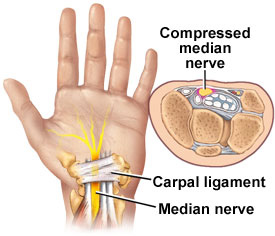|

What is Carpal Tunnel?
Carpal Tunnel Syndrome (CTS) is a painful condition that exacerbates the medial nerve by compressing it. The medial nerve is especially important because it aids with the ability to feel and move various parts of the hand. Many hereditary or health factors can cause CTS such as Family history of CTS, hormonal changes due to pregnancy, diabetes, age, and rheumatoid arthritis.
Some of the symptoms one would encounter include:
Diagnosis:
A number of specialized testing can be done to diagnose CTS.
Although there is not a sure fire way to prevent Carpal Tunnel Syndrome, there are ways to relieve some of the stress we put on our wrists and hands on a daily basis. Since CTS is not bias, anyone can be at risk for this condition.
Here are some key pointers to help ward off that evil wrist pain.
At work For many people, our jobs consist of repetitive motions while pounding away on a keyboard. First, it's important to make sure your posture is adequate. It's so easy to get into the habit of slouching over in our chairs while sitting at a desk. Over time, this can take a toll on other parts of our bodies including neck, upper back, shoulder, and arms. Sitting with your spine in the back of the chair while keeping your wrists straight is imperative. Furthermore, there is no need to forcefully press your fingers against each key of the keyboard. Light tapping will do just fine. Even if you don't spend your time working at a desk, this doesn't mean the coast is clear. Occupations that include using power tools that give off strong vibrations can also cause wear and tear to your nerves. This can pertain to city workers, carpenters, and truck drivers. Whether working at a desk or drilling away outside, it is a good idea to take frequent breaks and perform necessary stretching for these particular jobs or anything that relates. This means taking a few minutes to stretch your arms and squeeze your shoulder blades together. At home There are plenty of things at home that can cause damage to your hands and wrists as well. Opening tightly closed jars for example can cause damage to the wrist. Doing this repeatedly over time can lead to weakness in the hand. Try not to keep lids firmly closed. Hobbies like knitting, crocheting, or beading can also cause CTS. Although these interests are enjoyable and help us relieve stress, the tedious work that goes into the craft can cause nerve damage as well. It's important to be aware of what you are doing and how you are doing it. Try to form good habits so you get used to performing things the correct way. |